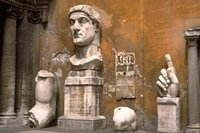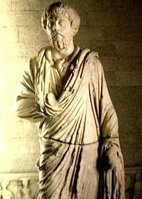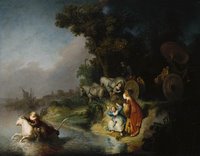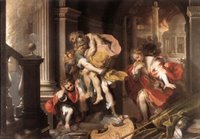Please
read just enough of the history here to get a feeling of what kind of
writer Ammianus Marcellinus was. From what you read, do you think he
deserves more attention than he usually gets? Do you see any particular
strengths/weaknesses? Is the history interesting? Would you like to
read more when you get a chance?
Roman Keyline Blog 2025
Official Blog of History 422--Ancient Rome
Monday, October 6, 2025
Ammianus Marcellinus (extra credit)
Ammianus
Marcellinus is the kind of writer ancient history graduate students
hear about but don't actually read. I suspect that is because he writes
about that "no man's" land period that neither ancient historians nor
medieval historians are really comfortable with. Well, here's your
chance to join the elite, those who have actually read portions of
Ammianus Marcellinus' Roman History. The
history originally covered all the emperors from Nerva through Valens.
The early sections are no longer extent, and what we have picks up
during the reign of Constantius. There's some good information here on
Constantius, a great analysis of Julian, and good information on
Julian's successors Valens and Valentinian, figures I don't talk about
in class.
Julian the Apostate (extra credit)
 Later Christian writers felt it important to answer Julian the Apostate's criticisms of Christianity in his book Against the Galileans. They quoted liberally from the book, and, partly because of their interest, we have substantial portions of a book that might otherwise have been lost.
Later Christian writers felt it important to answer Julian the Apostate's criticisms of Christianity in his book Against the Galileans. They quoted liberally from the book, and, partly because of their interest, we have substantial portions of a book that might otherwise have been lost.Read through "Against the Galileans," and cite here a line or two
Edict of Milan (extra credit)
 The reign of Constantine is certainly an important turning point in the history of Rome and in the history of the church. Please read through the Edict of Milan. Cite one line that particularly well shows a way in which Constantine changes things for the church.
The reign of Constantine is certainly an important turning point in the history of Rome and in the history of the church. Please read through the Edict of Milan. Cite one line that particularly well shows a way in which Constantine changes things for the church.
Constantine and his economic policies (extra credit)
 Diocletian and Constantine attempted to solve, not only the political and social problems of Rome, but also fundamental economic problems as well. Bruce Bartlett argues that the two did exactly the wrong thing. Please read Bartlett's article How Excessive Government Killed Rome. Do you think Bartlett's criticisms accurate? Why, or why not?
Diocletian and Constantine attempted to solve, not only the political and social problems of Rome, but also fundamental economic problems as well. Bruce Bartlett argues that the two did exactly the wrong thing. Please read Bartlett's article How Excessive Government Killed Rome. Do you think Bartlett's criticisms accurate? Why, or why not?
Herodian of Antioch (extra credit)
 Herodian of Antioch's History of the Roman Empire is an important source for the AD 180-238 period. Choose one of the emperors from this period (possibilities include Commodus, Pertinax, Didius Julianus, Septimius Severus, Macrinus, Bassianus, and Alexander Severus) and note what Herodian has to say about that emperor. Cite here an example of that emperor's competence (or lack thereof) and an example of the difficulties that emperor faced, looking especially for problems that emperor had with the Roman army.
Herodian of Antioch's History of the Roman Empire is an important source for the AD 180-238 period. Choose one of the emperors from this period (possibilities include Commodus, Pertinax, Didius Julianus, Septimius Severus, Macrinus, Bassianus, and Alexander Severus) and note what Herodian has to say about that emperor. Cite here an example of that emperor's competence (or lack thereof) and an example of the difficulties that emperor faced, looking especially for problems that emperor had with the Roman army.
If you prefer, you might comment on one of the important women leaders, e.g., Julia Maesa or Julia Mamea. You might also like looking at what Herodian has to say about Xenobia, the queen of Palmyra.
You may find the site linked here a bit difficult to navigate. Persevere! Use the "page" button at the top to navigate through the eight *books* of this history looking at the book heading to see which emperors are included in that book. Once you find the right book, click through each of the chapter links to find the material on the emperor you want to talk about.
Marcus Aurelius (Extra Credit)
 Plato said that, in an ideal society, the philosophers would be the kings, or the kings would be philosophers. Marcus Aurelius in some ways would seem to be exactly the kind of "philosopher emperor" Plato would have wanted. Please read the opening sections of Marcus Aurelius' Meditations. Choose a line that particularly well shows one of the things Aurelius particularly values, and note whether this value would make him a good emperor or not.
Plato said that, in an ideal society, the philosophers would be the kings, or the kings would be philosophers. Marcus Aurelius in some ways would seem to be exactly the kind of "philosopher emperor" Plato would have wanted. Please read the opening sections of Marcus Aurelius' Meditations. Choose a line that particularly well shows one of the things Aurelius particularly values, and note whether this value would make him a good emperor or not.
Suetonius' Lives of the Caesars (extra credit)
 Suetonius' Lives of the Caesars is one of the most important sources for the period following Nero's Death. Among his "Twelve Caesars" are Galba, Otho, Vitellius, Vespasian, Titus, and Domitian Suetonius includes all sorts of fascinating biographical details about the men he describes--along with plenty of sometimes unverifiable gossip and rumor.
Suetonius' Lives of the Caesars is one of the most important sources for the period following Nero's Death. Among his "Twelve Caesars" are Galba, Otho, Vitellius, Vespasian, Titus, and Domitian Suetonius includes all sorts of fascinating biographical details about the men he describes--along with plenty of sometimes unverifiable gossip and rumor.For extra credit, please read Suetonius account of any one of the caesars of this period (links above) . Pick an incident from the life of this caesar that shows a way in which Augustus' system (the Principate) can work well, or an incident that shows that system created by Augustus was not working out particularly well.
If you have fallen behind on your blogs, you can add to your extra credit by doing an extra blog entry on a *different* ceasar than you talk about in your first post.
Selections from Tacitus' Histories (Extra Credit)
 Most of the historical works written by the Romans disappeared long ago. But while other books were lost, Tacitus' works survived--though, sometimes, just barely. Can you guess why this might later figures thought the works of Tacitus worth preserving? Please read the first few paragraphs of Tacitus' Histories, and see if you can find a line or two that explains the appeal of Tacitus and his approach to history.
Most of the historical works written by the Romans disappeared long ago. But while other books were lost, Tacitus' works survived--though, sometimes, just barely. Can you guess why this might later figures thought the works of Tacitus worth preserving? Please read the first few paragraphs of Tacitus' Histories, and see if you can find a line or two that explains the appeal of Tacitus and his approach to history.
Ovid
 Most of the Greek and Roman myths you read in high school were re-tellings of stories from Ovid's Metamorphoses. Choose your favorite myth and read Ovid's version of that myth. Read also one of the Ovid myths that you *hadn't* read before. Cite one example for each myth that shows particularly well Ovid's "insight into the human condition."
Most of the Greek and Roman myths you read in high school were re-tellings of stories from Ovid's Metamorphoses. Choose your favorite myth and read Ovid's version of that myth. Read also one of the Ovid myths that you *hadn't* read before. Cite one example for each myth that shows particularly well Ovid's "insight into the human condition."If you want to get the overall picture of the Metamorphoses, see this excellent introduction and commentary by Larry Brown.
Virgil
 Please read this summary of Virgil's Aeneid. Then read as much as you can of Book I and Book II. Skimming through Book I is sufficient. Please read Book II with a bit more care.
Please read this summary of Virgil's Aeneid. Then read as much as you can of Book I and Book II. Skimming through Book I is sufficient. Please read Book II with a bit more care.Cite a line or two from Book I or Book II that particularly well show Virgil's "insight into the human condition," i.e., that shows his understanding of subjects like fate, the relationships between men and women, relationships between men and gods, the impact of war, etc.
Subscribe to:
Comments (Atom)
